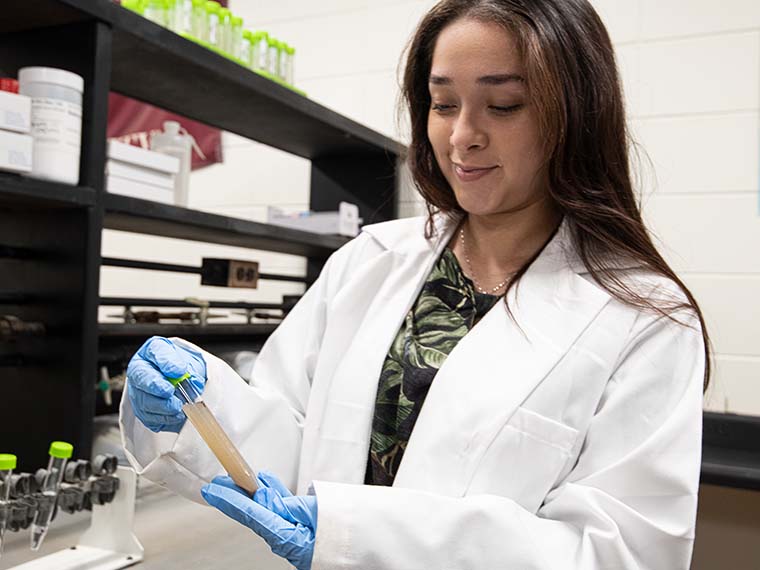The information presented on this page may be dated. It may refer to situations which have changed or people who are no longer affiliated with the university. It is archived as part of Mississippi State University's history.
From a young age, Ariadna Santos had a drive to help solve crimes. An early fascination in autopsies and the desire to help solve homicides led to an interest in forensics. The senior biochemistry major has embraced research at Mississippi State to help her prepare for a future career in a crime lab.
While originally from Tegucigalpa, Honduras, she was drawn to MSU because of its proximity to her grandparents, who live in Brandon. She was also eager to attend a big university and interested in the variety of programs offered at MSU.
In the summer of 2022, Santos studied soil microbiomes under the direction of Dr. Shankar Ganapathi Shanmugam, MAFES scientist and assistant research professor in the Department of Plant and Soil Sciences and the Institute for Genomics, Biocomputing and Biotechnology. She pursued the project to learn more about soil metagenomics, an experience that will help her when she enters the forensics field. The project entitled "Assessing the Influence of Soil Core Functional Microbiome on Germination and Seed Quality Using Image Analysis," measured the effects of microbes in soil and their effect on the growth of plants.
The research specifically assessed ten samples of seven different types of soil from all over Mississippi including samples near Highways 47 and 45. While Santos did not specifically analyze the microbes in her research, she took part in the extraction, incubation, and community-level physiological profiling of the soil. Her work included analyzing how the plants grow, and if the plant had any defects while growing.
For the analysis, Santos used Biolog Ecoplates, multiwell plates that test the metabolic capabilities of bacterial populations. Each 96-well plate has 31 carbon assays in triplicate.
"After placing the soil extractions in the plates, microbes in soil extraction utilize the carbon sources as they respire, and the tetrazolium reporter dye is reduced to form a visible purple color. A plate reader analyzes the reaction patterns and returns data to the researchers so that they can review the results. The results will help to identify spatial and temporal changes in metabolism of microbial communities in the soil that affect soil health," she said.
Santos noted how soil is a key factor in plant health.
"The soil is very important to agriculture in general and it's vital to understand what soil factors influence plant growth," Santos said.
The data still needs to be analyzed but Santos said that by better understanding the environmental influence of each soil on microbial communities and soil functions, researchers will be able to modify the soil to positively affect plant life.
"With what we know about the organisms that affect the soils, we can find ways to help those soils be a little bit healthier," she said.
Santos encourages other students to pursue research opportunities that interest them as well.
"Research is something that constantly makes you learn," Santos said. "Even if it's small projects, I really recommend participating in any kind of research."
After graduating with a degree in biochemistry, Santos plans to apply to a crime lab and become a forensic scientist, working with soil and entomology.
Dr. William Kingery, plant and soil sciences professor, and Dr. Nisarga Kodadinne Narayana, postdoctoral associate in the MSU Institute for Genomics, Biocomputing and Biotechnology, also contributed to the work. The research is a project in the CALS Undergraduate Research Scholars Program funded by the Mississippi Agricultural and Forestry Experiment Station.

